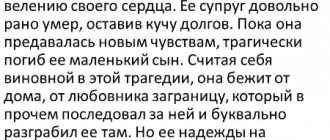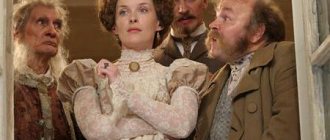Essay: The Cherry Orchard: drama or comedy? (based on the play by A.P. Chekhov)
(389 words) The work of A.P. Chekhov “The Cherry Orchard” has been provoking debate for many years on the topic: “Is it a drama or a comedy?” Chekhov himself insisted that his play was a comedy, but many critics insist otherwise. We will try to come to conclusions on our own by analyzing some details.
The first thing you should pay attention to is the heroes. Anton Pavlovich describes them in a caricature, assigning each a characteristic that ridicules him. Petya Trofimov is an “eternal student”, Epikhodov is a man of “twenty-two misfortunes”, the servant Yasha behaves as if he is from high society. Their behavior is absurd and funny, which is typical of comedy.
But let’s try to look at history from a different angle and understand Ranevskaya. Her fate is tragic. They want to sell the house where she grew up, where she spent her happy childhood. The garden that she loves with all her heart is proposed to be cut down. She lost her beloved son. This causes severe pain. And her behavior (the way she ignores Lopakhin, throws a ball on the day of the auction and invites an orchestra there) can be explained by the fact that she wants to forget herself, not think about the bad, to delay the moment of farewell as long as possible, because deep down in her soul she understands that there will be no other outcome.
Second is the plot. Tragic story! Because throughout the entire play we worry about how this story will end. Will Ranevskaya decide on Lopakhin’s proposal to cut down the garden? Or will it be sold? And if they sell it, to whom? The plot makes us worry, and it doesn’t matter whether we sympathize with Ranevskaya or despise her.
But humorous situations also emerge in this story. Lyubov Andreevna is almost a beggar, but does not value money at all. She distributes them to all the beggars, eats the best food, and organizes holidays. In one scene she gave her wallet to the servant Yasha, in the second she “accidentally” scattered them on the ground: “Well, they fell…”. At the end of the work, she receives money from a rich relative, but do you believe that this will change her life?
Finally, let's talk about the meaning of the play. Chekhov compares the cherry orchard with Russia. The world around him changes, but he remains the same. Does this mean that you need to change with him? Or should we preserve what is already beautiful? The author chooses the first outcome. And it is not clear whether he is tragic or not. The work was written in 1903. At that time, society was divided; the opinions of some did not agree with the opinions of others. After the revolution of 1905-1907, autocracy was limited, and this served as a starting point for future changes in the state. Were they for the better? There is no clear answer to this question.
Thus, “The Cherry Orchard” is a tragicomedy - a genre that combines elements of comedy and tragedy.
Author: Elena Leontyeva
Essay on the theme of the cherry orchard, drama or comedy
“The Cherry Orchard” - comedy, drama or tragedy?
Chekhov gave his last play the subtitle “comedy.” But in the first production of the Moscow Art Theater, during the author’s lifetime, the play appeared as a heavy drama, even a tragedy. Who is right? It must be borne in mind that drama is a literary work designed for stage life. Only on stage will drama acquire a full-fledged existence, will reveal all the meanings inherent in it, including gaining genre definition, so the last word in answering the question posed will belong to the theater, directors and actors. At the same time, it is known that the innovative principles of Chekhov the playwright were perceived and assimilated by theaters with difficulty and not immediately. Although the Moscow Art Theater, sanctified by the authority of Stanislavsky and Nemirovich-Danchenko, the traditional interpretation of “The Cherry Orchard” as a dramatic elegy was entrenched in the practice of domestic theaters, Chekhov managed to express dissatisfaction with “his” theater, dissatisfaction with their interpretation of his swan song. “The Cherry Orchard” depicts the farewell of the now former owners to their ancestral noble nest. This topic was repeatedly covered in Russian literature of the second half of the 19th century and before Chekhov, both tragically, dramatically and comically. What are the features of Chekhov's solution to this problem? In many ways, it is determined by Chekhov’s attitude towards the nobility, which is disappearing into social oblivion and the capital that is replacing it, which he expressed in the images of Ranevskaya and Lopakhin, respectively. In both classes and their interaction, Chekhov saw the continuity of bearers of Russian culture. For Chekhov, the noble nest is first and foremost a center of culture. Of course, this is also a museum of serfdom, and this is mentioned in the play, but Chekhov still sees the noble estate primarily as a cultural nest. Ranevskaya is his mistress and the soul of the house. That is why, despite all her frivolity and vices (many theaters imagine that she became a drug addict in Paris), people are drawn to her. The mistress returned, and the house came to life; the former inhabitants, who had apparently left it forever, began to flock into it. Lopakhin matches her. He is sensitive to poetry in the broad sense of the word, he has, as Petya Trofimov says, “thin, gentle fingers, like an artist... a subtle, gentle soul.” And in Ranevskaya he feels the same kindred spirit. The vulgarity of life comes at him from all sides, he acquires the features of a rakish merchant, begins to boast of his democratic origins and flaunt his lack of culture (and this was considered prestigious in the “advanced circles” of that time), but he is also waiting for Ranevskaya in order to cleanse himself around her, to reveal again contains an artistic and poetic beginning. This portrayal of capitalism was based on real facts. After all, many Russian merchants and capitalists, who became rich by the end of the century, showed interest and concern for culture. Mamontov, Morozov, Zimin maintained theaters, the Tretyakov brothers founded an art gallery in Moscow, the merchant son Alekseev, who took the stage name Stanislavsky, brought to the Art Theater not only creative ideas, but also his father’s wealth, and quite a lot. Lopakhin is a capitalist of a different kind. That is why his marriage to Vara did not work out; they are not a match for each other: the subtle, poetic nature of a rich merchant and the down-to-earth, everyday, everyday adopted daughter of Ranevskaya, completely lost in the prose of life. And now comes another socio-historical turning point in Russian life. The nobles are thrown out of life, their place is taken by the bourgeoisie. How do the owners of the cherry orchard behave? In theory, you need to save yourself and the garden. How? To be socially reborn, to also become a bourgeois, which is what Lopakhin proposes. But for Gaev and Ranevskaya this means changing themselves, their habits, tastes, ideals, and life values. And therefore they silently reject Lopakhin’s proposal and fearlessly move towards their social and life collapse. In this regard, the figure of a minor character, Charlotte Ivanovna, carries deep meaning. At the beginning of Act 2, she says about herself: “I don’t have a real passport, I don’t know how old I am... where I come from and who I am, I don’t know... Who are my parents, maybe they didn’t get married... I don’t know. I want to talk so much, but with whom... I don’t have anyone... I’m all alone, alone, I don’t have anyone and... and who I am, why I am, is unknown.” Charlotte personifies the future of Ranevskaya - all this will soon await the owner of the estate. But both Ranevskaya and Charlotte, in different ways, of course, show amazing courage and even maintain good spirits in others, because for all the characters in the play, with the death of the cherry orchard, one life will end, and whether there will be another is very guesswork. The former owners and their entourage (i.e. Ranevskaya, Varya, Gaev, Pischik, Charlotte, Dunyasha, Firs) behave funny, and in the light of the social oblivion approaching them, stupid and unreasonable. They pretend that everything is going on as before, nothing has changed and will not change. This is deception, self-deception and mutual deception. But this is the only way they can resist the inevitability of inevitable fate. Lopakhin rather sincerely grieves, he does not see class enemies in Ranevskaya and even in Gaev, who bullies him, for him these are dear, dear people. The universal, humanistic approach to man dominates in the play over the class-class one. The struggle between these two approaches is especially strong in Lopakhin’s soul, as can be seen from his final monologue of Act 3. How are young people behaving at this time? Badly! Due to her young age, Anya has the most uncertain and at the same time rosy idea about the future awaiting her. She is delighted with Petya Trofimov’s chatter. The latter, although 26 or 27 years old, is considered young and seems to have turned his youth into a profession. There is no other way to explain his immaturity and, most surprisingly, the general recognition he enjoys. Ranevskaya cruelly but rightly scolded him, and in response he fell down the stairs. Only Anya believes his beautiful calls, but, we repeat, her youth excuses her. Much more than what he says, Petya is characterized by his galoshes, “dirty, old.” But for us, who know about the bloody social cataclysms that shook Russia in the 20th century and began literally immediately after the applause died down at the premiere of the play and its creator died, the words of Petya, his dreams of a new life, the desire taken up by Anya to plant another garden - we are all this should lead to more serious conclusions about the essence of Petit’s image. Chekhov was always indifferent to politics; both the revolutionary movement and the fight against it passed him by. But in A. Trushkin’s play, Petya appears in the night scene of Act 2 in a student cap and jacket and... with a revolver, almost hung with grenades and machine-gun belts. Waving this entire arsenal, he shouts words about a new life in the same way as the commissars spoke at rallies fifteen years later. And at the same time, he is very reminiscent of another Petya, more precisely, Petrusha, as Pyotr Stepanovich Verkhovensky is called in Dostoevsky’s novel “Demons” (apparently, it is not for nothing that Chekhov’s surname Petya was formed from the patronymic of Petrusha’s father, the liberal of the 40s Stepan Trofimovich Verkhovensky). Petrusha Verkhovensky is the first image of a revolutionary terrorist in Russian and world literature. The rapprochement of both Sings is not without reason. A historian would find both Socialist Revolutionary motives and Social Democratic notes in the speeches of Chekhov's Petit. Stupid girl Anya believes these words. Other characters chuckle and sneer: this Petya is too much of a klutz to be afraid of. And it was not he who cut down the garden, but a merchant who wanted to build summer cottages on this site. Chekhov did not live to see other dachas built in the vast expanses of his and our long-suffering homeland by the successors of the work of Petya Trofimov (or Verkhovensky?) on the numerous islands of the Gulag archipelago. Fortunately, most of the characters in “The Cherry Orchard” did not have to “live in this wonderful time.” As already mentioned, Chekhov is characterized by an objective manner of narration; his voice is not heard in prose. In a drama, it is generally impossible to hear the actual author’s voice. And yet, is “The Cherry Orchard” a comedy, drama or tragedy? Knowing how much Chekhov did not like certainty and, therefore, incomplete coverage of a life phenomenon with all its complexities, one should carefully answer: a little of everything. The theater will still have the last word on this issue.
“The Cherry Orchard” - drama, comedy or tragedy?
Anton Pavlovich Chekhov forces his readers and spectators to turn on their heads and think at first glance at the cover of the book, at the playbill. Serious debate about the genre of the work flared up in 1903, when the play was written. They continued in 1904, when the production premiered at the Moscow Art Theater.
Chekhov himself positions this work as a comedy. It includes such characters as Charlotte, who performs tricks and makes everyone laugh, and Epikhodov, who always ends up in incredibly entertaining stories. But even though everyone is trying to make jokes about the play, it still takes on a tinge of sadness and pain.
The situation in which the heroes of the play Ranevskaya, Petya and Anya, Gaev find themselves is more like a tragedy. The owners are ruined and they have to sell the estate, the main decoration of which is the cherry orchard. And even though the cherry orchard is desolate, there is no one to look after it, saying goodbye to one’s native place is painful and everyone loses a piece of themselves. Ranevskaya admits “...I have always wasted money without restraint, like crazy...”. You can also notice that the characters have simply become attached to the place and do not want to part with it, but it’s time. The merchant Lopakhin offers Ranevskaya to cut down the cherry orchard and rent out the land. This way you can pay off your debts, but she flatly refuses, she is against cutting down the garden. After all, the garden is her youth. Ranevskaya clings to the past with all her might. He wants to save the garden, but does nothing to save it. As a result, the estate is sold, they hear the sound of an ax and everyone says goodbye to this place. And Ranevskaya says that she even felt relief from this. After all, now there is nothing to worry about. Anya and Petya say goodbye to the past and hope for a better future. But there is uncertainty in the air, a hazy future.
The message of tragedy in the play is more affected and this is due to such a “double” color of the characters. They cry, they lament and grieve, but by and large they don’t care. They don't do anything to correct the situation. Ranevskaya is just spending money. Petya is just busy with idle talk about how he needs to work, while he himself has done nothing for five months. Chekhov shows us him as an eternal student. Gaev, having heard the sound of billiard balls, forgets about everything.
But each character in the play has his own intense internal struggle, which is more important than everything that happens “behind the curtains of the eyes.” It is this wordless internal battle that makes you empathize with the characters in the play.
It is absolutely impossible to judge the genre of “The Cherry Orchard” in any case. And despite doubts, you should trust the author. This path is a comedy, but a comedy through tears and heartache. And each main character has his own pain.
Throughout the play, Anton Pavlovich Chekhov invites all of us: actors, directors, each of us, and himself, to a conversation that is very important for everyone: is my life filled with meaning? Do the works of my hands bring any benefit? Are we not the dragonflies from Krylov’s fable, intoxicated by the aroma of cherry blossoms in spring?
Grade 10




